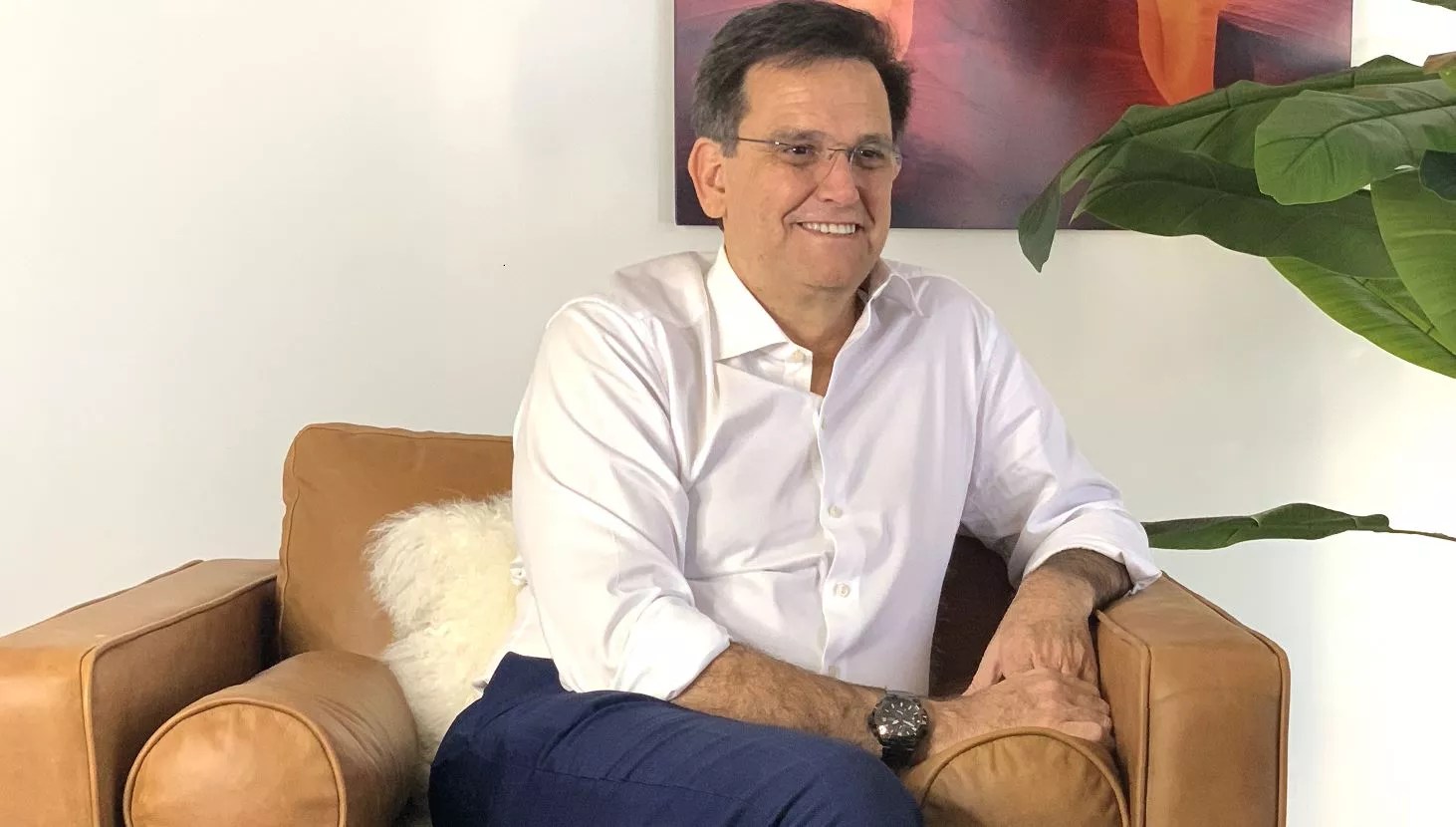
SurchX

Audio By Carbonatix
Robert Maynard Jr. says he’s writing a book about his life story. The working title is One Fucked Up Dude.
A Phoenix resident perpetually chasing multimillion-dollar business ideas, Maynard co-founded the companies LifeLock and Internet America, and more recently SurchX, a credit-card business. He’s often referred to himself as a “serial entrepreneur.”
Until troubles began to surface toward the end of 2019, SurchX was looking like a rather promising new entrepreneurial endeavor. A financial tech company, it helped businesses shift credit card merchant processing fees onto cardholders. SurchX employed dozens of people, inhabited swanky offices in downtown Phoenix, and had drawn accolades from Arizona Governor Doug Ducey as it aimed for possible tax credits through the Arizona Department of Commerce. (It never received them.) Maynard was living large: an apartment at the swanky Optima in Scottsdale, a top-of-the-line Tesla.
As with many businesses Maynard has had his hand in over the years, the good times wouldn’t last. SurchX has since collapsed, burning up an estimated $8 million of investor cash on its way down.
Over the phone, Maynard sounds tired. He’s sitting alone in temporary office rental space, pondering the SurchX disaster. Maybe the book has legs. Maybe the sales from it can pay off some of his debts from the SurchX debacle.
The original investors are screwed, he admits. He insists they knew what they were getting into.
“It’s a total loss,” Maynard told Phoenix New Times, adding that investors signed investor suitability questionnaires before putting money into the now-failed startup. “It basically says I could rape your wife, and you can’t sue me. I could rape your wife and take all your money, and you can’t sue me.”
As for Maynard’s significant other – his fiancee – they’ve since split up, though not before he borrowed $400,000 from her and sunk it into SurchX. (Maynard hurried to add that he intends to pay her back every penny, and that he has already made one installment of $50,000 on the loan.)
He says the stress of his company’s problems caused a breakdown related to his bipolar disorder.
“I’ve been intensely incapacitated since late October,” Maynard said in early February. “In hospitals for four weeks at a time. I’ve been unable to think, type. I’ve lost like 30 pounds … It was just Saturday I was able to speak clearly.”
Even if Maynard summons yet another novel new business idea, he doesn’t have the stamina to carry it through, said Francine Hardaway, former vice president of communication for SurchX and a friend of Maynard’s.
“He’s 58. That may be young for some, but his body has been wrecked by various combinations of medications and their stupid side effects. Right now he has Tartanic [sic] dyskinesia, which causes him to grind his teeth so severely that they keep breaking. It comes from certain antipsychotic drugs used for bipolar disorder.”
Maynard told New Times he was treated for a broken tooth recently, but that it wasn’t related to any disorder. He said that Hardaway is prone to hyperbole.
“He’s the most complex person on the planet,” Hardaway said, “and it doesn’t help him. He can’t take it over the finish line.”
LifeLocked Out
Maynard was born and raised in Phoenix, the son of longtime Phoenix optometrist Robert Maynard. He’s a former Marine and Army reserve officer. And he’s led several businesses since the early 1990s. Though some of those businesses ultimately arrived at great success, the result for Maynard has always been spectacular failure.
After decades spent trying, Maynard has yet to make his business ideas work for himself in the long term. Along the way, he’s developed a reputation as a businessman with signs of brilliance, but also as a compulsive liar and incompetent leader who’s reckless with other people’s money.
Maynard should be living comfortably at this point in life because of what he did with LifeLock, the ethically challenged but financially savvy anti-identity theft company based in Tempe. Back in the early 2000s, he and co-founder Todd Davis invented a veritable money-making machine.

Robert Maynard called SurchX his third “unicorn” company, a name for private startups valued at more than billion. Accordingly, the office housed a bronze unicorn statue.
SurchX
Today, Davis lives in a 13,000-square-foot, $5 million custom home in Chandler. After taking the company public in 2012, he retired in 2016 when it was bought by Symantec for $2.3 billion.
But Maynard long had been out of the picture at LifeLock by then.
He separated from the company in 2007, following a Phoenix New Times article that showed he had lied about how LifeLock was founded, and revealed he had been previously banned from the credit-repair industry – to which LifeLock was loosely related – by the Federal Trade Commission.
As part of LifeLock’s marketing scheme when it began, Maynard and others had spread a story of how Maynard came up with the idea for an anti-identity-theft company: They said it was because identity theft had once led to his arrest and jailing. Someone had stolen his identity – maybe a murderer, Maynard told the media.
He was in the Maricopa County Jail for 12 days back in 2003 – that much was true. But as New Times revealed, he’d been arrested for failing to pay back a $16,000 casino marker he’d taken out at the Mirage Hotel in Las Vegas. Maynard quit in the resulting firestorm of negative media attention caused. Years later, he would say he remembered nothing of the incident, which happened while he had been undergoing a period of electroshock therapy.
Maynard left the fledgling LifeLock with about 10 percent of the shares, soon cashing them in and putting millions of dollars in his pocket. He tore through the money in just a few years, before LifeLock went public and made investors like Davis a fortune.
Maynard and his ex-wife declared Chapter 7 bankruptcy in July 2013, reporting debt of between $10 million and $50 million.
Incredibly, the experience was the second time something like this had happened to Maynard. SurchX, if it were to ever become a successful business, would make the third.
The ‘Serial Entrepreneur’
Maynard filed his first personal bankruptcy in 1990, and a year later filed another bankruptcy related to some early business failures. Within a few years, he had founded the National Credit Foundation in Phoenix, a company that claimed to help people repair their credit histories.
The firm raked in millions of dollars before the FTC shut it down, calling it a scam that was blatantly ripping off its customers by misusing their credit cards.
Maynard moved to Dallas and founded an early internet service provider, Internet America. For a time in the age of dial-up, it was the largest ISP in Texas and one of the largest in the country. Maynard, the CEO, occasionally made the Texas papers for the tech startup, including once for having a “cyberstalker” who sent numerous creepy messages to Maynard and his family.
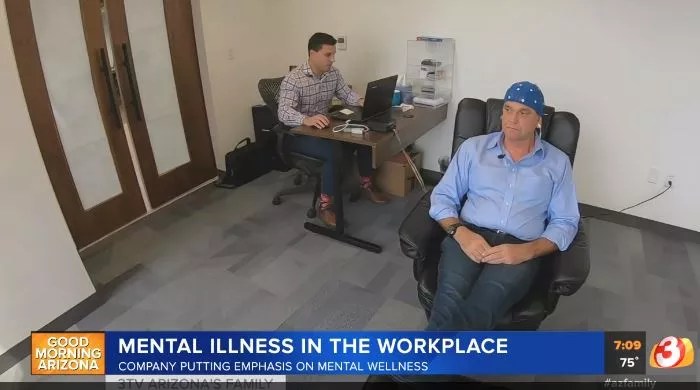
Maynard underwent a brain scan at work in a 2019 TV news piece.
KTVK
Yet as writer Thomas Korosec noted in a 1996 Dallas Observer article about Internet America, “curiously, Maynard was the one in this [cyberstalker] feud who has been arrested before for alleged harassment.” As Korosec related, a former Internet America employee accused Maynard in 1995 of threatening his life. A Richardson, Texas, police report states that Maynard allegedly told the man by telephone, “I’ve killed 22 men with 22 shots. You’re next. I’m coming for you right now; keep your eyes open.”
Police arrested Maynard for alleged misdemeanor harassment in September 1995, the story relates, but the ex-employee later dropped his complaint after settling with Maynard in a separate civil case related to his employment.
Internet America never achieved LifeLock-level money, but it did make some people wealthy. After going public, its estimated stock valuation rose to just under $200 million at one point, according to a March 1999 Wall Street Journal article about how the stock was overvalued. The company was sold in 2015 to JAB (now Rise) Broadband.
But Maynard wasn’t at Internet America to share in those profits. He had resigned from the company before it went public after settling charges of fraud and deception with the FTC related to the National Credit Foundation. He denied wrongdoing and claimed at the time he settled to avoid the cost of a lawsuit. Part of the FTC settlement included a lifetime ban from any kind of credit-repair business.
After Maynard left Internet America, he founded Dotsafe, an internet-monitoring software for parents and schools. The company’s hallmark pitch was that it would sign up its first 2 million customers for free. It folded in 2001, leaving school districts scrambling to find new filtering software, and the would-be tech guru with more debt and no paycheck. He was struggling with money problems even as he and Todd Davis started LifeLock. As Maynard tells it, he was on “welfare,” including the SNAP food assistance program.
In 2005, Maynard filed for Chapter 7 bankruptcy. That was the same month that LifeLock began operations in Arizona, when money began pouring into Maynard’s accounts again.
Squandered Shares
Gerry Curciarello, now a managing partner at Dryden Street Capitol in Lake Forest, Illinois, met Maynard sometime in 2005. A Scottsdale colleague had heard about LifeLock, and Curciarello knew there was a “hysteria” in the public consciousness related to identity theft. The colleague introduced him to Maynard, and after a meeting of a few hours, they hit it off.
“I became an original angel investor,” Curciarello told New Times. “I invested quite a lot of money in LifeLock. I did pretty well, actually.”
LifeLock provided a service similar to a two-factor authentication for taking out new loans or starting new credit cards. It also offered a type of insurance for ID theft victims, referring them to another company for help with their losses. With a robust advertising budget, the company convinced hundreds of thousands, and later millions, of people, to pay a monthly fee for its service. It settled for $100 million with the FTC in 2015 because its advertising was deceptive. But by then, the company could afford that kind of loss.

Maynard’s Kandoo! Island sunk financially in 2009.
Davis “had the right kind of skills” to advance the startup, according to Curciarello.
People who “stuck around since the beginning” and remained investors until the Symantec buyout came out with 25 to 30 times their original investments, Curciarello said, adding, “not a bad deal.”
Maynard, after leaving LifeLock and cashing in his stock in 2007, moved to Hawaii and tried to start a new kind of ocean adventure business called Kandoo! Island, which was based on a large boat anchored off Waikiki. He envisioned patrons going out for the day on the boat and taking part in activities like jet-skiing, snorkeling, or para-gliding.
Curciarello said it didn’t sound like a business he wanted to invest in, and declined an offer to take part in it. But Maynard did find investors and also put his own money into the venture. In August 2009, the Honolulu Advertiser reported that Maynard had sunk $9 million into the business.
A few weeks after taking on its first passengers, Kandoo “ran afoul of insurance requirements and couldn’t make payroll for 253 workers,” the newspaper said.
Wreckage from the boat venture can be seen in Maynard’s 2013 bankruptcy filing, which lists creditors including boat companies and Hawaiian lenders. New Times received a call as late as 2018 from a former Kandoo employee, who wanted to know where he could find Maynard and obtain his final Kandoo paycheck.
New Investments
The year after his 2013 bankruptcy, state records show, Maynard filed for the trade name iValidate, the name of a company he’d started a few years before. Online records indicate the company, which was billed as the “world’s first personal credit bureau,” collected $5 million in investor seed money.
“Using industry-tested technologies like credit reports and credit scores,” says one online blurb about the now-defunct company, “individuals can now definitely identify other internet users and underwrite the personal and financial risk associated with them.”
This one sounded good to Curciarello, who plunked down a six-figure investment. He and other investors soon came to regret it.
“Truly, that crashed and burned,” he said. “Then two years he came back to me with this SurchX idea.”
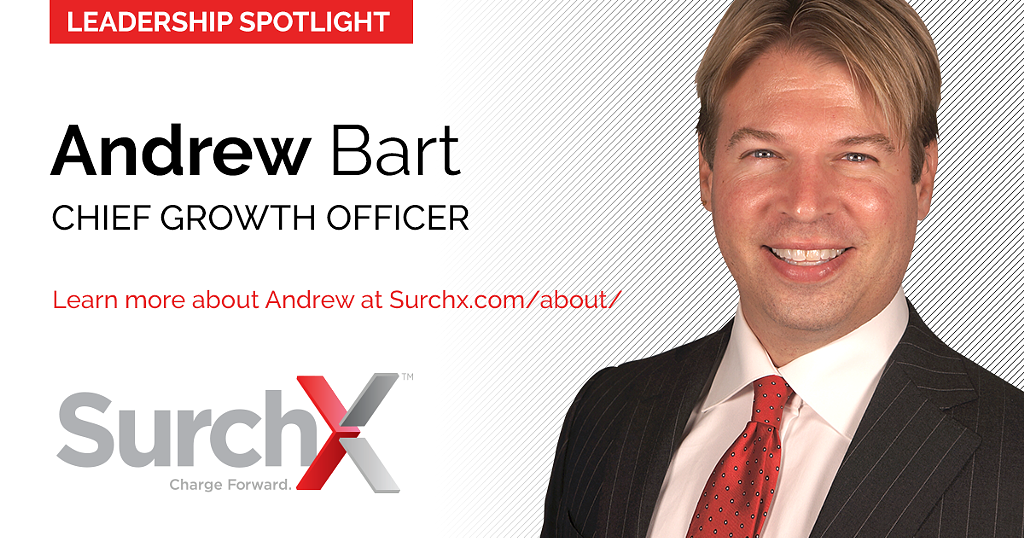
Andrew Bart
Surchx.com
Curciarello said he was more skeptical this time around, but that Maynard “can come up with some pretty interesting ideas.” Eventually, he invested $200,000 in SurchX.
The heart of the SurchX idea was software for small retailers that could eliminate merchant surcharges while processing a credit card, passing the fees onto customers. Other investors, like Tim Moran, an Arizona venture capitalist and managing partner for Precedo Capital Group in Scottsdale, also saw a spark in SurchX. Moran had lost money in iValidate, too, and when that company began going south, Maynard was “constantly coming to me for money,” Moran says.
So, with SurchX, Moran laid down some rules: “I said I will only invest in this deal if you don’t run the company or handle the money.” Maynard told him he would handle the marketing and bring in a team for other operations.
Andrew Bart, a local startup adviser who became chief growth officer for the company, said in an article published by SurchX in October 2019 that the previous year, “My friend Robert Maynard and I came to an agreement over a gentlemen’s bottle of wine.” Bart then helped Maynard recruit his team.
Bart wrote that he came to appreciate Maynard’s team-building style when he saw how Maynard managed to tap California businessman Scott McLernon as the company’s chief revenue officer. In the recruitment effort, “Robert didn’t pitch Mr. McLernon at all, but smartly concentrated his attention on Mr. McLernon’s wife, gauging the extent to which she was willing to sacrifice time with her newly retired husband.”
McLernon didn’t return messages for this article.
After Maynard assembled his team, he made himself the company’s CEO.
Bart didn’t want to talk to New Times about his relationship with Maynard or his feelings about SurchX’s failure. He said he felt confident a new group of experts and investors would soon take what was left of the company and start anew.
‘Cinderella Story’
Moran described Maynard as a very creative person with “great traits.” His investment pitches can be very convincing, Moran said, but he “loses touch with reality.”
In fall 2018, SurchX moved into an entire floor of the posh Two Renaissance Square high-rise in downtown Phoenix.
Maynard bragged in a November 2018 Phoenix Business Journal article that the company would have 150 employees by the end of 2019, and 500 by the end of 2020.
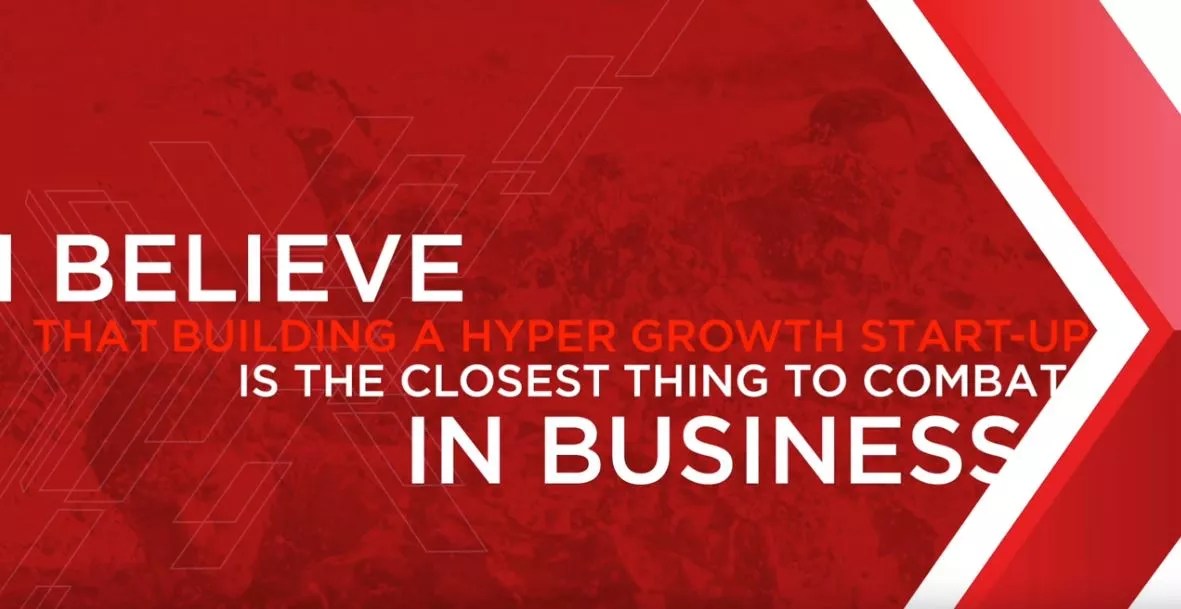
Video still from a Maynard presentation in June 2019.
YouTube
“We have about $18 billion in transaction volume already in our pipeline, which equates to $12 million in 2019 revenue,” he told the paper. “We’re just getting started. We’re expecting to do between $30 [million to] $40 million in top-line revenue with SurchX in 2019, and well over $100 million in 2020.”
After becoming eligible for $4 million in state grants and tax credits, the Arizona Commerce Authority lauded SurchX that December in a press release that featured Governor Doug Ducey stating that “SurchX will create 400 high-value jobs and add to the strength of Arizona’s innovation ecosystem.”
Maynard tirelessly shilled for investors, talking in equally grandiose terms about the business he was creating.
Yet Maynard oversold his potential to take the company to great heights. He sent out over-optimistic revenue projections that kept having to be cut back. Throughout 2019, SurchX suffered from poor revenue, unable to draw in the clients Maynard proclaimed it would.
According to his critics, including former SurchX employees who didn’t want to be named for this article, Maynard also misled potential SurchX investors about his credentials, suggesting he was a war veteran and inflating his business record.
“The companies I’ve created have created $7 billion in wealth from nothing,” he boasts in a June 2019 YouTube video made for “2019 Phoenix Startup Week.”

Maynard sent a photo of his special forces insignia after being asked about his service.
Robert Maynard
“Building a hyper-growth business is the closest thing to combat in the business world,” Maynard says in that same video. “Not that I love combat.”
“He says Ronald Reagan pinned a medal on his chest in the Oval Office,” says a man who worked with some of the SurchX investors, adding that Maynard “absolutely” claimed he had combat experience.
In a statement to New Times, Maynard would not comment directly about whether he had combat experience, saying only, “There was no declared war while I served.” He denies emphatically he told anyone President Reagan once gave him a medal.
Maynard also insists he never used his military record to persuade anyone to invest. As his Wikipedia and LinkedIn pages show, Maynard served in the Marines and did nine years in the U.S. Army as an officer who worked with the 12th Special Forces. Upon request, he showed New Times photographs of his special forces insignia. He said “some” of his time in the Army was in active service.
Maynard’s LinkedIn page stated that he was in the Marines as a combat engineer from June 1980 to January 1985, four years and eight months – until New Times called to inquire about it. Maynard then changed the LinkedIn site to say he was in the Marines for one year and eight months.
Asked about that change, Maynard said it was an honest mistake and that, “I have never said in public that I was in the Marines for five years except the error that I have corrected.” Yet his Wikipedia page still states he was in the Marines from 1981 to 1985.
A report from the National Personnel Records Center obtained from a source and verified with the center by New Times states that Maynard was in the Marines for five months, from December 1982 to May 1983. A second report states that Maynard did serve in the U.S. Army Reserve and U.S. Marine Corps Reserve, “however, no active duty was performed other than for training purposes.”
In some respects, Maynard seemed painfully honest in his SurchX sales pitches about his mental illness and how it affected his business life. He admits in videos that he lied about LifeLock’s founding. He discussed his struggles with bipolar disorder in online articles and how he’s attempted suicide twice.
For a May 2019 broadcast piece by AZFamily News (KTVK-TV and KPHO-TV), Maynard explained that being bipolar was his “superpower” and that he made a point to hire employees who are “neurodiverse.”
Maynard has “in-office brain scans and invites his employees to do the same on the company dime,” and “meditation and yoga are also weekly activities at SurchX,” the piece stated. Maynard, who “has a colorful history with his bipolar disorder,” “puts his money where his mouth is” and plans to spend $1,400 per employee on health benefits, the station reported.
To one critic who knew investors, Maynard used his mental illness history like a “Cinderella story.”
Not everyone was thrilled to see Maynard’s return to the business community.
“Hi,” Scottsdale resident Carie Learn emailed New Times in July. “I worked for this man at National Credit Foundation where he stole from so many. He is now on https://www.startupgrind.com/phoenix/ spreading more lies and promoting himself as someone to be admired. It is almost unbearable after all the people he has harmed.”
Burning Money
SurchX’s lackluster revenue meant a burn rate of more than $500,000 monthly, which was the amount the startup spent each month of its investors funds, one former company executive said. The glitzy Phoenix office was among the problems. Rent cost about $35,000 a month, not including expensive utility costs. The former executive said parking privileges alone ran to $5,000 per month.
Salaries of the executive team also consumed the startup funds. Maynard had his Tesla and luxury apartment. Asked about Maynard’s spending habits last year, Jared Peck, SurchX’s chief financial officer, said Maynard received a paycheck from the company and that he saw no evidence of funds being misused for personal use by any employee.
Others, however, said they saw Maynard’s spending as indicative of his leadership in the company – as well as a problem in and of itself.
“He overshot – he blew his wad,” Curciarello said, adding that going with such an expensive office seemed like a “simple decision” gone awry. “What the fuck – why would you do something like that? The original office of LifeLock was out of the back of a warehouse. I went there, I said, ‘I like this. You guys are focused.'”
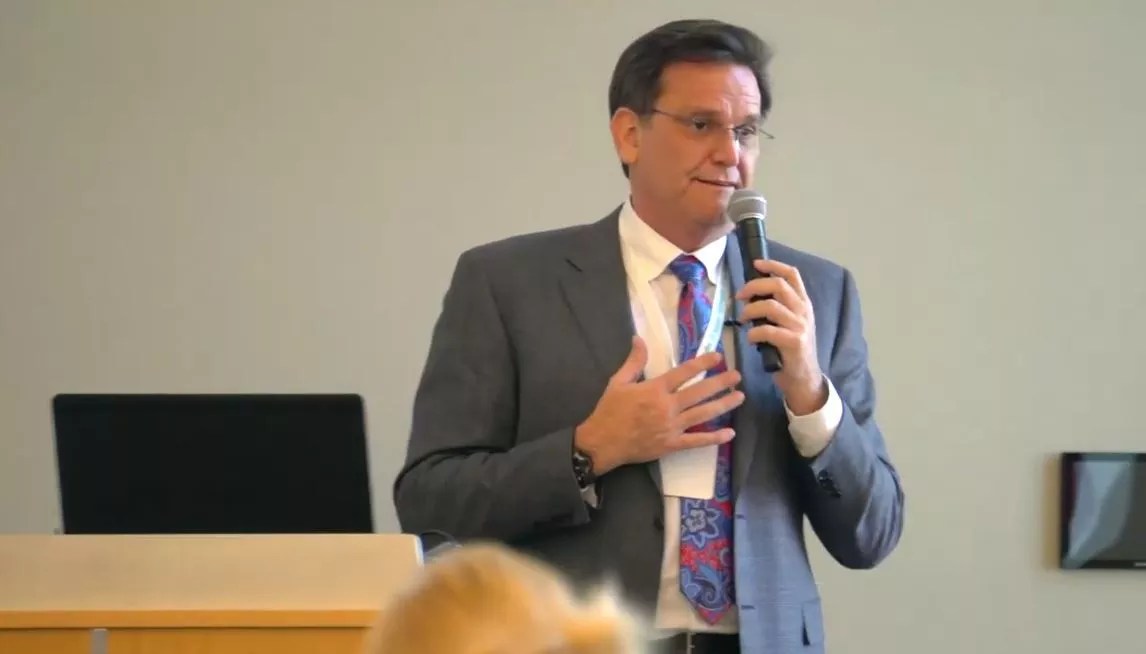
Robert Maynard pitches SurchX to a group of potential investors in June 2019.
SurchX, once running, was full of “self-inflated egos” and “sycophants,” Curciarello said. Maynard had “Tweedledumb and Tweedledumber” on the board, he added.
Moran said when he heard of Maynard’s new car and apartment in early 2019, he called a meeting. That’s when Maynard told him he had changed his mind and had decided to run the company. Moran told him he was pulling out. Maynard told him the company was headed for good times, and he could sell his shares later.
“I don’t give a shit,” Moran says he told Maynard. “Give me my money back.”
The company had gained a few clients by then and raised an additional $3 million, but as a Phoenix Business Journal article in August pointed out, the company was seeing “slower-than-anticipated” growth.
The CFO Peck and several other executives bailed.
SurchX then vacated its expensive office last fall in the face of a likely eviction notice, moving into a shared office space.
“Overall, we are in the Valley of Death right now,” Maynard told investors in a letter obtained by New Times in October. “In my last update I told you we were living hand-to-mouth. We are out of cash right now.”
Maynard told New Times in a subsequent article on the leaked email that running out of money wasn’t unusual for a startup and was “part of the birthing process.”
To Maynard, the company was always just one good investment deal away from clearing the necessary hurdles. SurchX announced its newest client in late November, but it was a small company. By that time, SurchX seemed about finished.
“I said, ‘You need to walk away,'” Curciarello said he told Maynard, reminding him that he came up with the idea and could still profit from it. “We talked a lot on the phone. He’s a super-likable guy. I can only attribute his failure – it’s medical. You can’t control yourself. It’s sad.”
Curciarello estimates he lost $200,000 on SurchX, in addition to another $200,000 he lost on iValidate.
The extent of the SurchX loss among investors isn’t public, so it’s not known if anybody lost their life savings in the collapse. Like other investors and representatives of investors New Times spoke with for this article, Curciarello said he can absorb the loss.
“It’s not going to break me,” he said. “It’s going to piss me the fuck off, but not break me.”
End of the Line?
In late January, Maynard shared with New Times a copy of an email he’d sent to his investors the week before.
“Sorry I’ve been silent,” the letter began. “I have spent a great deal of the past six weeks in the hospital or unable to type. I know many you have questions regarding the state of the business. Our cash call was insufficient to continue the business as it was and the Board determined we needed to proceed into an insolvency process.”
He explained that the company entered into a bankruptcy-like process known as an Assignment for the Benefit of the Creditors with a company affiliated with business advisory firm Sherwood Partners. SurchX assets would be sold off.
“There is a skeleton staff on board to maintain the current client base, but not to add momentum,” he wrote. “It is a tragedy that we find ourselves here. The rocket was just lifting off. Many of you have heard from the firm that has been hired to conduct the sale. I have no idea what the final bid will look like, but I don’t think it’s going to be friendly to the common shareholders. I will do my best to help salvage something for you.”
The idea of SurchX, though not the name, will apparently go on without him, just like some of his other businesses have done. As of last week, SurchX appears to have been reborn as something called InterPayments, with a new domain name and logo. Most of the website is similar to SurchX’s. No one returned a message left with the company.
“I failed to execute,” Maynard told New Times. “I overspent. We were very naive about how hard that business was to develop.”
The technical aspects “ended up being a lot harder than anybody imagined,” he added. “It just took forever to get the implementation done.”
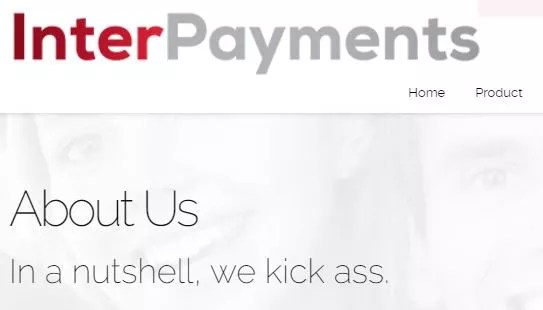
SurchX’s new name and new look.
Interpayments.com
He didn’t make decisions “in a vacuum,” he said, but “my decisions in hindsight were not good, as well-intentioned as they were, as reasonable as they seemed at the time.”
He said he ended up with the biggest losses from SurchX: “I guaranteed a lot of debt, so my loss will be well over $1 million.”
His bipolar disorder likely affected the business, he said. During a hypomanic phase, he might think he could do anything, he said.
“I thought, I’ll do it until I’m not qualified. That was a mistake. I should have brought in a better operator,” he said.
The business, in turn, also affected his mental health, he said.
“I ended up in the hospital because of what happened,” he said. “Two years of unremitting stress is what caused the breakdown.”
Maynard has spent the new year working on his book and going to doctors’ appointments. Leaving the business world behind for now, he’s just trying to get healthy.
“I really have to, or I’m going to die,” he said. “Or I’m going to miss my grandkids growing up.”
Still, rock-bottom and broke is a place Maynard has been before. As he said in the June 2019 video while trying to find more SurchX investors, “I’ve been told I would never work again by teams of doctors – twice.”
If he does start another company someday, “I will never be the CEO,” he said. “That success, vision, and flat-out power is intoxicating and very seductive.”